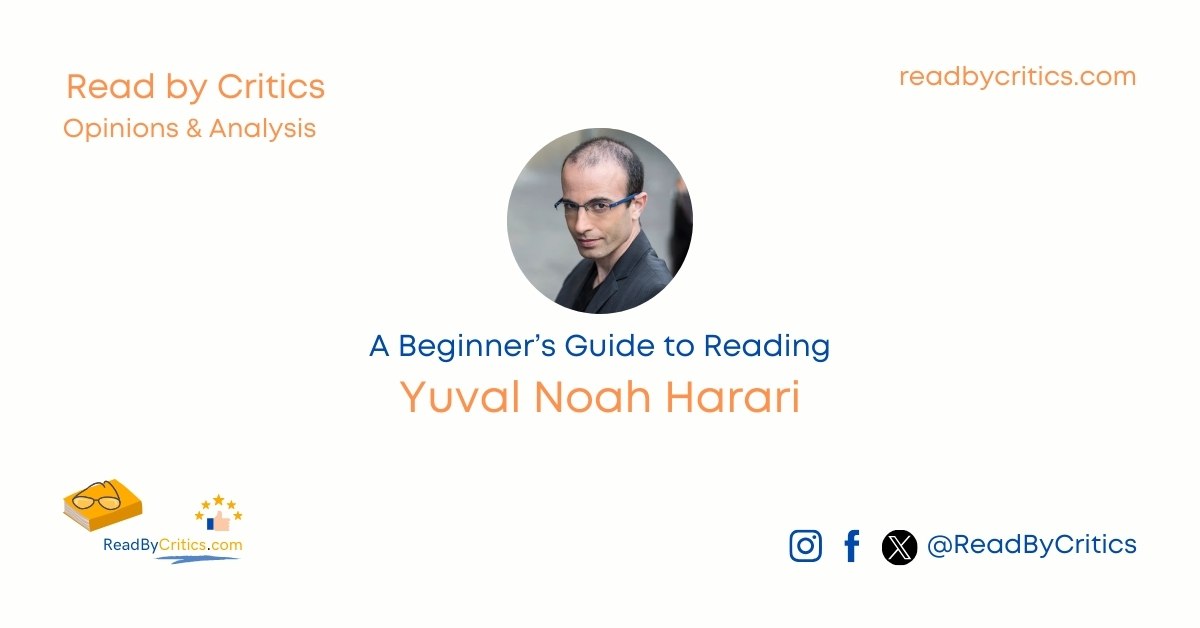Yuval Noah Harari is an Israeli historian, philosopher, and bestselling author renowned for his groundbreaking explorations of human history, consciousness, and the future of our species. Born in 1976, Harari earned his Ph.D. from the University of Oxford and is currently a Hebrew University of Jerusalem professor. He rose to global fame with Sapiens: A Brief History of Humankind (2014). This sweeping narrative traces the evolution of Homo sapiens from prehistoric foragers to the dominant force on Earth. His subsequent works, Homo Deus: A Brief History of Tomorrow (2016) and 21 Lessons for the 21st Century (2018), further cemented his reputation as a visionary thinker who bridges the gap between history, science, and speculative futurism. Harari’s ability to synthesise vast amounts of information into compelling, accessible prose has made him one of our time’s most influential public intellectuals.
Harari’s writing is characterised by its clarity, bold conjectures, and interdisciplinary approach. Unlike traditional historians who focus narrowly on events and dates, Harari weaves together anthropology, biology, economics, and philosophy to present a macro-historical perspective. His informative and provocative works challenge readers to reconsider deeply held beliefs about religion, capitalism, and human identity. His knack for simplifying complex ideas without dumbing them down is what sets Harari apart. He employs vivid analogies, thought experiments, and a conversational tone that makes dense topics engaging. Another hallmark of his style is his willingness to speculate about the future, blending historical analysis with futurism to explore where humanity might be headed. Whether discussing the rise of artificial intelligence or the ethical dilemmas of genetic engineering, Harari’s books are both enlightening and unsettling, pushing readers to think critically about the world.
While Yuval Noah Harari’s writing is undeniably engaging and thought-provoking, it has shortcomings. Critics argue that his sweeping generalisations and speculative leaps, though compelling, often lack rigorous academic support, particularly when he ventures into futurism and metaphysics. His interdisciplinary approach, while refreshing, sometimes leads to oversimplifications, glossing over nuanced debates in fields like anthropology, economics, and cognitive science. Additionally, his tendency to present controversial theories as near-certainties (e.g., the irrelevance of consciousness in a data-driven world in Homo Deus) can come across as overly deterministic, leaving little room for alternative interpretations. Some readers also find his detached, almost clinical tone unsettling when discussing profound ethical dilemmas, as if human suffering and cultural complexities are mere data points in a grand narrative. Despite these flaws, Harari’s ability to provoke discussion remains his greatest strength, even if it means sacrificing depth for accessibility.
If you’ve never read Harari before, prepare for a mind-expanding experience. His books are perfect for curious minds who enjoy big-picture thinking—readers who relish questions like Why do humans rule the world?, What might the future hold? How do myths and stories shape societies? Harari doesn’t just recount history; he reinterprets it, arguing that human progress has been driven by shared beliefs (like money, religion, and nations) rather than just biology or technology. His work particularly appeals to those who enjoy authors like Jared Diamond, Steven Pinker, or Malcolm Gladwell but crave a more philosophical and forward-looking perspective. Harari’s engaging storytelling and existential musings will keep you hooked even if you’re not a history buff.
Diving into Harari’s bibliography can be daunting, given the depth and breadth of his ideas. This guide is designed to help you approach his works in a structured way, whether you’re a complete beginner or looking to explore his lesser-known writings. Below, we’ve listed his most significant books in a recommended reading order, along with brief explanations of their key themes. By following this roadmap, you’ll better understand Harari’s intellectual evolution and the central questions that drive his work.
Yuval Noah Harari’s Best Books: A Curated Reading List
1. Sapiens: A Brief History of Humankind (2014)
Why start here? This is Harari’s magnum opus and the best entry point into his thinking. Sapiens chronicles the history of Homo sapiens, from the Cognitive Revolution (70,000 years ago) to the Agricultural Revolution (12,000 years ago) and the Scientific Revolution (500 years ago). Key takeaways include:
-
How myths and collective beliefs (like money and religion) enabled large-scale human cooperation.
-
Why agriculture might have been a “luxury trap” rather than pure progress.
-
The unforeseen consequences of human dominance over nature.
2. Homo Deus: A Brief History of Tomorrow (2016)
What’s next? If Sapiens explains our past, Homo Deus speculates about our future. Harari examines how humanity might evolve in an age of artificial intelligence, biotechnology, and dataism. Highlights include:
-
The potential end of death and the rise of a new “superhuman” elite.
-
How algorithms might replace human decision-making.
-
The shift from worshipping gods to worshipping data.
3. 21 Lessons for the 21st Century (2018)
Why read this? While Sapiens and Homo Deus deal with grand historical arcs, 21 Lessons focuses on pressing contemporary issues. Harari tackles topics like nationalism, fake news, and the meaning of life in a rapidly changing world. Key insights:
-
Why liberal democracy is in crisis.
-
How to navigate misinformation in the digital age.
-
The ethical challenges posed by AI and automation.
4. Sapiens: A Graphic History (2020-2021, with David Vandermeulen & Daniel Casanave)
Who is this for? If you prefer visual storytelling, this illustrated adaptation of Sapiens makes Harari’s ideas even more accessible. The graphic novel format adds humour and vivid imagery while retaining the original’s intellectual depth.
5. Unstoppable Us (2022, with Ricard Zaplana Ruiz)
Is this for kids? Yes! Harari’s first children’s book simplifies the ideas of Sapiens for younger readers (ages 10+). It’s a great way to introduce kids to big history, engaging them with colourful illustrations and storytelling.
Why Harari’s Work Matters?
Yuval Noah Harari is more than just a historian—he’s a guide to understanding humanity’s past, present, and possible futures. His books challenge us to reflect on what it means to be human in an era of rapid technological and social change. Whether you start with Sapiens or jump straight into 21 Lessons, his ideas will leave you questioning assumptions and seeing the world differently. So pick up one of his books, brace yourself for a mental adventure, and prepare to see history—and the future—through fresh eyes. The journey is as thrilling as the destination. Happy reading!
Alka for ReadByCritics




